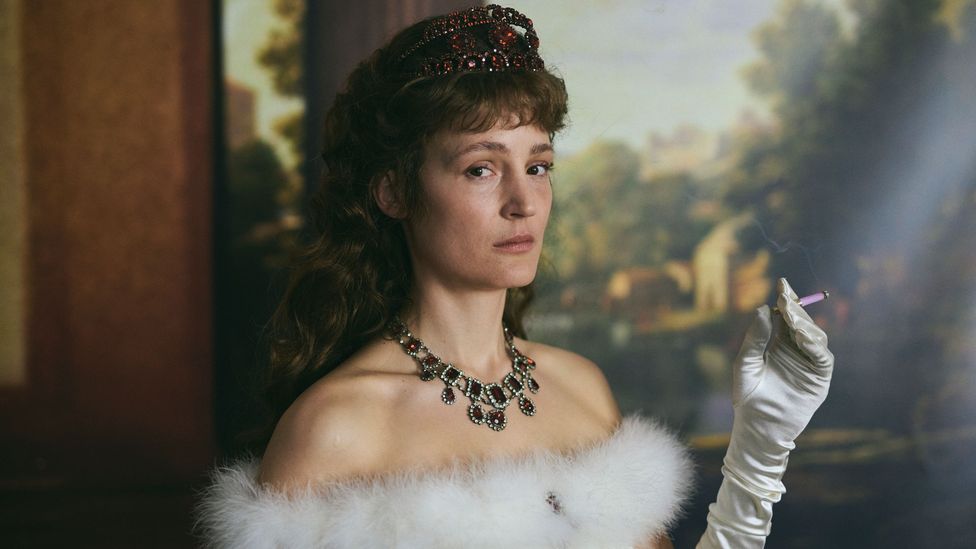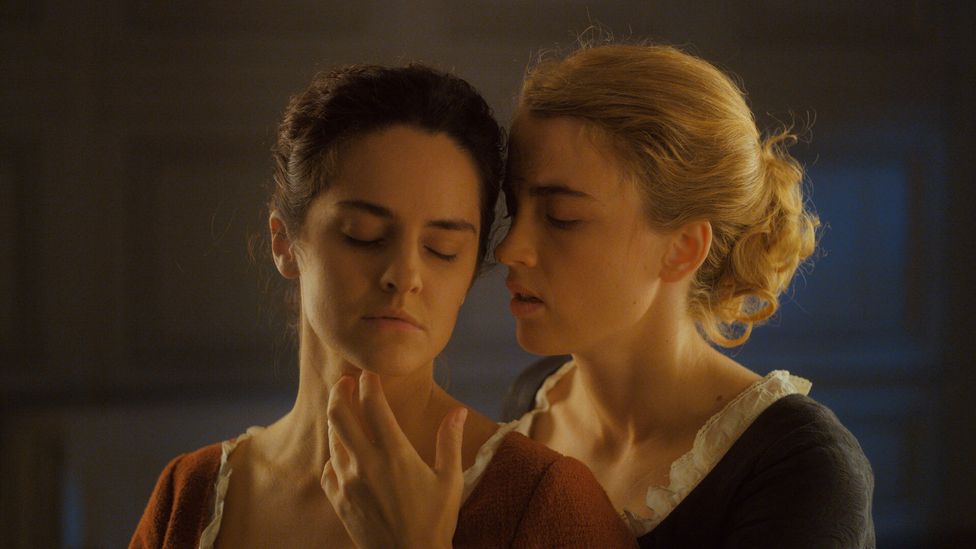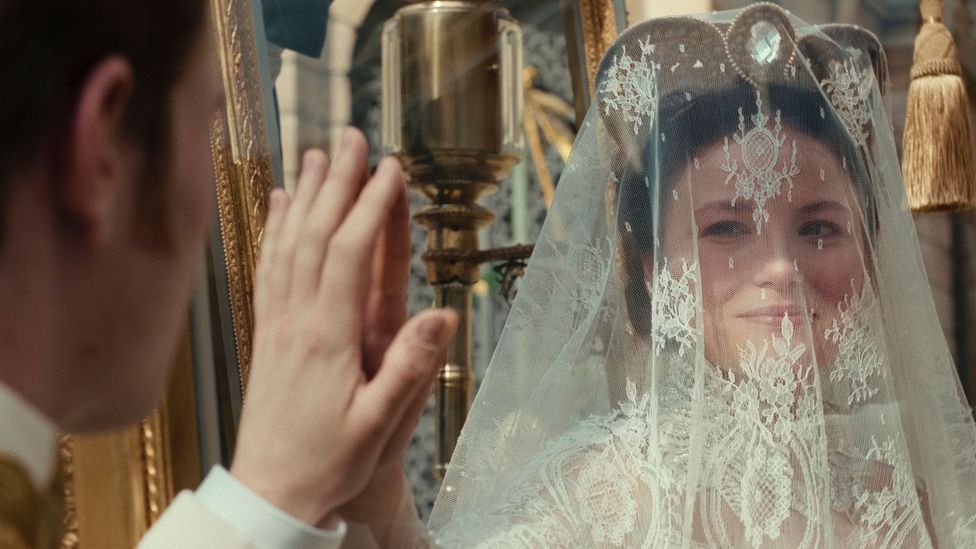The first royal celebrity

Empress Elisabeth of Austria (or “Sisi” as she was colloquially known) was one of the most famous women in the world at one time. One of the most audacious, even eccentric, female celebrities of her time, she served as monarch and helped to create the dual monarchy of Austria-Hungary – along with her husband the Emperor Franz Joseph – in the mid-19th Century. Considered a phenomenal beauty and obsessed to the point of pathology with shrinking her waist size, she was also an early adopter of psychiatry, rigorous physical exercise at a period when women were advised against it, and an ardent reader of philosophy and literature. Her tumultuous and defiant life – which ended in her assassination at the age of 63 by an anarchist – is the topic of new film Corsage, the latest portrayal of a figure who has long been the source of public interest.
More like this:
– The images that fool the mind
– The woman whose naked body was a canvas
– The painter who revealed how we really see
In the past five years or so, it’s fair to say there’s been something of a surge in the sub-genre of the feminist-inclined period drama, from British independent films like Lady Macbeth to period accuracy in Sebastian Leilo’s The Wonder, revisionism and fun in Netflix super-hit Bridgerton, to the reverent critical love for a film like Céline Sciamma’s Portrait of a Lady on Fire. And that’s without looking at the recent literary adaptations: Anya Taylor-Joy as Emma; a critically maligned attempt to rethink Persuasion; and a stab at DH Lawrence’s racy Lady Chatterley’s Lover, another story that seems poised for a reconsideration of sorts, given its focus on female sexuality that was so shocking for its time.

Vicky Krieps wanted to play Sisi after reading a biography of her as a teenager (Credit: Felix Vratny/IFC Films)
And now it’s the turn of the real historical figure, with Austrian filmmaker Marie Kreutzer’s elegantly wrought, insightful historical biopic, starring the phenomenal Vicky Krieps as Empress Elisabeth, or Sisi, of Austria. Corsage is set in 1877 – the sartorially celebrated beauty is on the cusp of turning 40, a much more daunting prospect in the 19th Century than it might be today. The story revolves around the melancholy Empress’s increasing rebelliousness and dislocation from her husband and her duties. Emperor Franz Joseph (Florian Teichtmeister) is disinterested and rigid, seemingly content for his wife to fritter away her days doing almost nothing of political import (he was criticised in the past for letting her “interfere”) and spend their lavish wealth on fripperies. Sisi, though, is terminally bored and clearly unhappy. The loss of an infant some years back still haunts her, even though she has an active mind and a then-considered-highly-unusual love for the outdoors and rigorous physical exercise. “Vicky did a lot of physical preparation for the film – horseback riding, fencing and ice swimming,” Marie Kreutzer tells BBC Culture. “But the character was shaped so much by her costumes and her hair, and I was always so impressed whenever she entered a room as the Empress. It was like: ‘oh my God, here comes the Empress!'”
The subject of gossip and rumour at a level no different than a famous woman of today, Sisi was an early avatar of female celebrity, and the complexities that fame holds when it comes to beauty, ageing and power. Kreutzer never shies away from Sisi’s obsession with her weight and diet, and Krieps reacts with a flush-faced, faux-modest grin whenever anyone (wisely) flatters her appearance. Yet Corsage does not judge its protagonist for indulging in vanity; what other subject should such an energetic and bright woman throw herself into, given society’s expectation of her? Although the woman clearly suffers with disordered eating – to say the least – and the film goes on to depict the harsher realities of her life, the story is open to the vivacity of its protagonist, so luminously portrayed by the talented Krieps. In fact, it was Krieps herself who first read a biography of Empress Elisabeth of Austria as a teenager, and who was keen to work on a film about her with Kreutzer.
Life on screen
Perhaps unsurprisingly, given her reputation for flamboyance even in her day, Corsage is not the first depiction of Empress Sisi on the screen. In a trilogy of Austrian films from the 1950s starring Romy Schneider – Sissi, The Young Empress, and Fateful Years of an Empress – she is portrayed as both superficial and impetuous, attributes that make for good melodrama. The fascination with her is not limited to Austria, though: a slick-looking German prestige show with a sexual shock factor, entitled Sisi, was first aired last year. Sisi remains good value as a figure of entertainment – Netflix series The Empress clearly shows that, seeking production values and a political subterfuge that echo the model of shows like The Crown. But Corsage does something more.
As well as telling its story with style, visual openness and a thorough eye for detail, Corsage asks what it means to be faithful to the lived realities of women’s history, while also not smothering audiences with the often-miserably-limited existences that those women sometimes faced. “There was an original quote that she wrote down, which is also in the movie: ‘when you’re turning 40, you’re disappearing,'” Kreutzer says. “At that time, 40 was old. What can a woman who is only known and loved for her beauty be after that, when her only currency is taken away from her? So I thought it would be interesting not to show a depressed, tragic, sad Empress, but a woman who is saying: ‘I’m trying to find my way out, and I’m not going to meet my expectations of you anymore.'”
Kreutzer has an excellent eye for the interiority not only of her protagonist but of each of the supporting players in the Austro-Hungarian court hierarchy, from two ladies-in-waiting exchanging terrified glances as Sisi passes a flirtatious cigarette to a wounded soldier on a hospital visit, to the raised eyebrows at the Empress’s choice of leisure activity. It’s clear how entrenched the cast and creative team had to be in 19th Century social mores in order to subtly convey the unconventionality – borderline eccentricity – that Empress Sisi was thought to harbour. In a time where defiance was often confused with madness, that was a risky proposition.

Céline Sciamma’s Portrait of a Lady on Fire (2019) won the Queer Palm at Cannes (Credit: Lilies Films)
That bears itself out in a scene in Corsage – and not the only one – where Sisi expresses suicidal impulses or attempts to harm herself. One in particular is shockingly well-staged: a light bit of fencing between husband and wife in one of their spectacular, many-windowed rooms becomes a heated disagreement. When the Emperor, who will always have the upper hand and the real power, threatens to keep Sisi away from her daughter and her beloved dogs, and storms from the room, the camera stays static. Sisi, with zero warning, approaches a window, swings her leg over the side, and disappears without a sound. Kreutzer explains: “Sometimes I don’t say cut, and the actors are disciplined enough to keep acting. So they have to do something to fill the void. And so Vicky was crying, and then suddenly she went to the window and jumped out, and everybody was like: ‘What is she doing?!’ It was on the ground floor, but it wasn’t planned!”
Krieps’s brilliant improvisation aside, the film makes it clear that part of the reason a woman like Sisi could continually get away with rebellious behaviour and even deteriorating mental health – that is to say, that she was not made destitute or institutionalised – was her enormous privilege and wealth as the wife of the Emperor. In a painful scene where Sisi visits a women’s asylum, she sees that several of the patients have been hospitalised for things she, herself, is dealing with: one for adultery; another for uncontrollable grief over the loss of a child. In the 19th Century, the male medical establishment pathologised womanhood to the extent that it took very little to end up in an institution.
Part of that – in the film as in life – involved Sisi’s fascination with the then-newfangled practice of psychiatry. “She never really liked going to the balls and big events,” Kreutzer says. “But wherever she went, she went to visit hospitals, and she was especially interested in psychiatry. It was very young at that time. And it was brutal, but it was also – at that time – finally possible to get treatment for mental issues. So Sisi was extremely interested in that. I think she is trying to connect with people all over the film, and nobody really sees her for what she is. Think about that: you have your husband, but he’s also your boss. You have your friends, but they are really your servants. So there’s no one really on your eye level. But at the asylum, I wanted to show her relating to some of the women – of course, for selfish reasons. But she sees something of herself in them.”

Netflix’s 2022 series The Empress also follows the story of Sisi, played by Devrim Lingnau (Credit: Netflix)
And yet, in other ways, it’s possible that a slavishness to historical or period accuracy can be at odds with an intended artistic statement. Most books about the Hapsburg dynasty or 19th-Century history have been written by men, and define Empress Sisi in very particular ways. As any maker of a biopic could tell you, sticking too closely to the facts can obfuscate rather than elucidate. That’s why it’s refreshing that Kreutzer includes so many sly anachronisms in her film; the subtle kind that makes you do a doubletake. There’s a yellow plastic janitor’s mop in the hallway of an 18th-Century Austrian palace, or a black corded telephone on the wall. None of the objects are visually lingered on, or quite as blatant as, for example, the shot of Converse All-Stars in Sofia Coppola’s Marie Antoinette. (That film is another deliciously subversive biopic of a controversial woman of history, a comparison that is both useful and somewhat limiting as it is tonally very different, more self-consciously and pointedly frivolous – to match the youthfulness of its protagonist – than Corsage, where its heroine is older. Yet one can imagine the young Sisi as not too different in temperament from Marie.)
“We are always so sure about the history books,” Kreutzer says about historical accuracy. “But so much of what we think we know is from other movies about a subject, too. And we think we know exactly when something was created, but there’s almost always someone else who may have had the same idea earlier. So if I wanted to use a chair from 1910, I used it. It became very playful, and the idea was to integrate [the anachronisms], so it wouldn’t feel too obvious. So it’s modern, but in a subtle way. It was the same with music – we had it played live, using only instruments that only existed at the time.”
Kreutzer accomplishes a truly delicate and challenging balancing act, which is to tell the truths at the core of Sisi’s life – including the uglier ones around mental health – without conveying a dispiriting, downbeat image of another long-suffering woman. The result is a film that, in spite of taking its name from the corset, a restrictive garment, has a flexibility and openness both in terms of its visual vernacular and its approach to depicting history and womanhood. Vicky Krieps and Marie Kreutzer have created a living, breathing woman who sulks and sings and loves her dogs and masturbates in the bath. They’ve done a pretty amazing thing with Corsage: cracked the alabaster facade of a 19th-Century glamour icon and made her real.
Corsage is released in the US on 23 December, in the UK on 26 December, and in France on 25 January 2023.
Love film and TV? Join BBC Culture Film and TV Club on Facebook, a community for cinephiles all over the world.
If you would like to comment on this story or anything else you have seen on BBC Culture, head over to our Facebook page or message us on Twitter.
And if you liked this story, sign up for the weekly bbc.com features newsletter, called The Essential List. A handpicked selection of stories from BBC Future, Culture, Worklife and Travel, delivered to your inbox every Friday.








